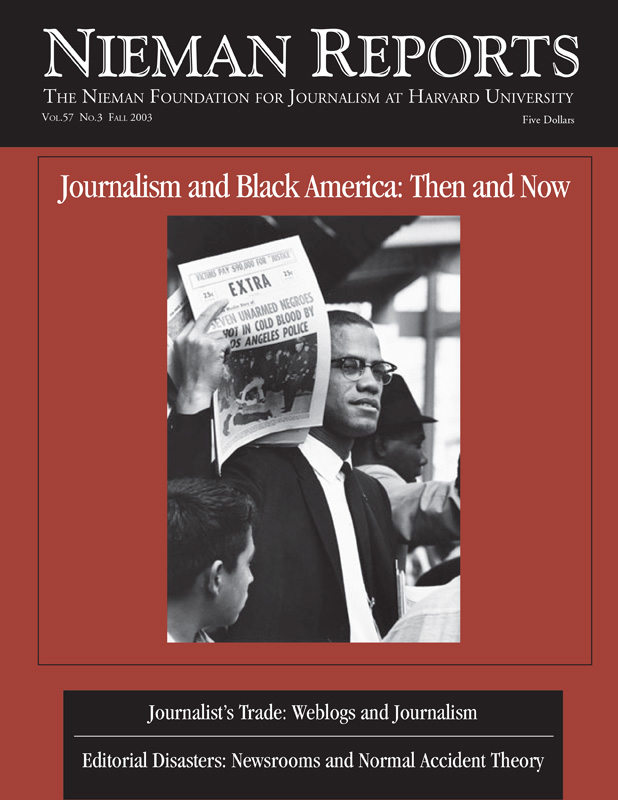The press and what passes for the political opposition spent much of July giving the White House a hard time about a spurious 16-word sentence in George Bush’s State of the Union message. July? Bush delivered the message on January 28. What happened during all of February, March, April, May and June?
Well, there was a war and Jessica Lynch to cover. The likelihood that the President had used bogus information to sell the war he was eager to launch seemed to be judged by press and politicians as not all that consequential despite ample early warning that the administration had a truth-in-advertising problem.
After all, Bush had charged in that January speech that Iraq “recently sought significant quantities of uranium from Africa,” but the claim was debunked within weeks by Mohammed ElBaradei, director of the International Atomic Energy Agency (IAEA) and head of the U.N.’s nuclear inspection team in Iraq. “Based on thorough analysis,” he told the United Nations Security Council on March 7, “the IAEA has concluded … that these documents—which formed the basis for the reports of recent uranium transactions between Iraq and Niger—are in fact not authentic. We have therefore concluded that these specific allegations are unfounded.”
Seymour Hersh followed up on this news in a New Yorker article that appeared at the end of March. He reported that the crudely forged uranium documents were initially circulated by British intelligence, but that they were given to U.N. weapons inspectors by the U.S. government. Hersh added that ElBaradei’s disclosure of the forgery “has not been disputed by any government or intelligence official in Washington or London.”
Journalists Drop the Story
Then, shamefully, the story died. It lost its pulse despite a top U.N. expert’s declaration, on the record, that doctored evidence figured in the U.S. case against Iraq notwithstanding both a credible report that the United States may well have trafficked in the fakery and the inescapable implication that the President had broadcast phony claims in his State of the Union address.
Phony claims were made not just about uranium. In the sentence immediately following the reference to uranium, Bush said, “Our intelligence sources tell us that [Saddam Hussein] has attempted to purchase high strength aluminum tubes suitable for nuclear weapons production.” A few days later, Colin Powell, speaking at the United Nations, dealt at length with the aluminum tubes, tying them to an Iraqi uranium enrichment program. On March 7, however, after months of studying procurement patterns, looking into the possibility of an Iraqi enrichment program, inspecting Iraqi documents and interviewing Iraqi personnel, ElBaradei also threw cold water on this scare talk. He declared there was no evidence “that Iraq intended to use these 81mm tubes for any project other than the reverse engineering of rockets.”
So by spring of this year both of the administration’s efforts to connect Iraq to the deadliest of weapons of mass destruction were pretty much in tatters. Nevertheless, there was no hue and cry about what looked like administration deception. That didn’t happen until months later, when former U.S. ambassador to Gabon Joseph Wilson described in a July 6th New York Times op-ed a mission he undertook for the Central Intelligence Agency in February 2002 to check out a reported uranium deal between Niger and Iraq.
Wilson wrote, “It did not take long to conclude that it was highly doubtful that any such transaction had ever taken place.” He added, “Based on my experience with the administration in the months leading up to the war, I have little choice but to conclude that some of the intelligence related to Iraq’s nuclear weapons program was twisted to exaggerate the Iraqi threat.”
Wilson’s article triggered a flood of criticism of the Bush administration, but ElBaradei already had shown that the administration’s case for war was flimsy and, worse, that phony documents were part of the picture. Wilson added only marginally to what was known.
So why did it take some four months from the disclosures by ElBaradei and Hersh for press and politicians to find their voice and ask tough questions, at least about the uranium portion of Bush’s State of the Union message?
Context may not be everything, but it can explain a lot. While the war against Iraq had begun officially on March 19, the war drums beat well before then as troops were deployed and polls registered strong support for action against Iraq. Given the prevailing climate, including the verbal attacks being made on France and others for being soft on Saddam, it was convenient and simple to brush aside “old news” questions. Once the war was underway, and the news was dominated by the dash for Baghdad and scenes of victory, there was even less appetite to question the evidence for war.
By the time Wilson’s piece appeared, the dominant news from Iraq was of a mounting toll of American casualties, and the word “quagmire” began to be used. Suddenly, the press and politicians had not only a peg on which to hang questions that should have been raised months earlier, but also a more congenial climate to raise them in.
All in all, this leaves us with the uninspiring picture of watchdogs who were asleep on the job when they should have been barking.
Gilbert Cranberg is former editor of The Des Moines (Iowa) Register’s editorial pages.


